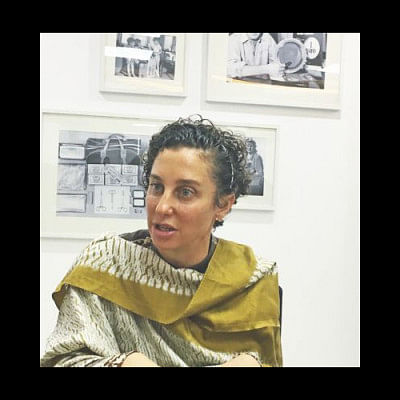Engage community in fight against child marriage

Community-driven initiatives can bring about real changes to the scenario of child marriage in the country.
If people of a community become agents of the changes -- necessary for creating an environment not supportive of early marriage, nothing else can be a better solution, said Dena Kimball, executive director of The Kendeda Fund.
The organisation in association with CARE Bangladesh has been working for three yearsto fight the social menace in the country.
Their first project on child marriage -- Tipping Point -- has been extended for another three years. On this occasion, Dena came to visit Bangladesh to see for herself how far the project had left its mark.
The project has been working at the community level, encouraging discussions among people of all ages.
This is how they get to learn better ways to deal with their social and economic challenges other than marrying their daughters off, said Dena in an interview with The Daily Star before leaving for the USA on December 6.
“It is probably the hardest way to work.”
CARE and other partners in other countries that The Kendeda is working with are trying to connect that work to the broader dialogues that are happening nationally and internationally to help create a better understanding of the problem.
Bangladesh has the second highest rate of early marriages worldwide with about 52 percent girls being married off before they reach 18, according to Unicef. Niger tops the chart.
The legal marriageable age has been mostly debated upon at discussions centring on child marriages following the enactment of Child Marriage Restraint Bill 2017 in February. The bill has a provision allowing boys and girls to be married off at any age under “special circumstances” with permission from court and guardians, which is the instigator of the debate.
But there are a lot more issues to be paid attention to and discussed if a sustainable, effective solution is sought, Dena said.
CARE has so far worked in 90 villages in haor areas of Sunamganj with financial assistance from The Kendeda. Now in the second phase, it is aiming to work in char areas of Rangpur as well, which are as frequently hit by natural calamities like floods.
Alongside addressing issues surrounding poverty and livelihood, an understanding of the role of girls and women in society,their empowerment and the way they are valued, is important to bring sustainable changes to the scenario, Dena observed.
One of the interventions that CARE and The Kendeda find effective in building that understanding is community talk shows. Families are invited to the dialogues.
The talk shows bring forth examples of girls within the community whose parents have made difficult choices, refraining from the usual practice of early marriage, and how they have eventually succeeded in life.
The stories of their personal experiences can then inspire others, bending the social norm gradually, Dena continued.
The Kendeda as a foundation believes in supporting research and gaining knowledge going deeper into an issue and communicating that to broader platforms, while seeking a solution, said Dena.
Laws and policies defining the legal marriage age will not help prevent child marriage or early marriage of girls, she said, “there is a whole slew of other laws and policies around education, around access to health, reproductive health” that the government should pay heed to find a solution.
As an initiator of change, The Kendeda and its partner CARE encourage and train their facilitators working on the ground so they discuss social and sexual taboos with caution showing respect to the long-practised tradition, she said.
“It's a process… It's about persistence. It's not about coming in and trying to blow up the village.”
A simple piece of information like that the gender of a child is decided by the male sperm can help transform society's attitude towards the mothers of girl children.
Adolescent girls having this information can share it with the younger generations and the coming generations in the process of attaining sustainability, said an optimistic Dena,based on her experience of the changes she had noticed in the haorareas.
She concluded by assuring that she would be working for the long haul towards ensuring a better environment for girls and women living in Bangladesh.

 For all latest news, follow The Daily Star's Google News channel.
For all latest news, follow The Daily Star's Google News channel. 



Comments